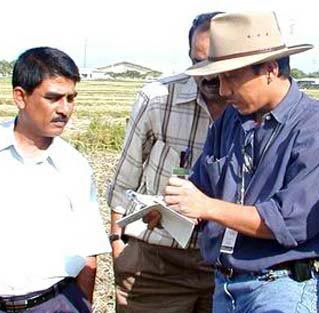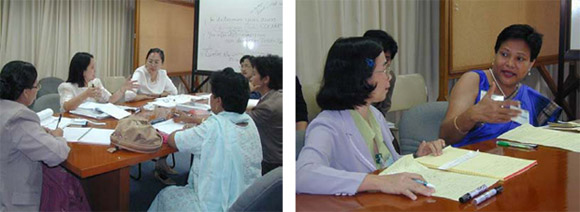Facilitating groups
 What is facilitation?
What is facilitation?
Facilitation literally means “making things easy”. Facilitators aim to help people make decisions and achieve results in meetings, team building sessions, problem-solving groups and training events. Facilitation aims to you want to draw on the ideas of all and not allow a few to dominate, and to present the output of an event in an easily understandable form.
Why facilitate?
In almost every aspect of agricultural research and community development, we have meetings or events. For increased efficiency someone is often asked to facilitate these events.
What are the six steps and skills required for good facilitation?
- Clarify objectives of the meeting.
- Set ground rules.
- Develop a focus question to assess the level of participant commitment to the subject or issue being discussed (e.g., “How important is...?”).
- Develop a few key discussion questions that are designed to gather information about the subject or issue being discussed (e.g., “What is the problem with...?”).
- Conduct the meeting (i.e., manage the process).
- Assess the participants’ understanding and progress throughout the meeting.
What are some of the different forms of facilitation?
There are different forms of facilitation with differing forms of involvement and interaction:

* Socratic direction is a process of asking questions and reformulating answers as necessary to lead participants to the
desired learning outcome.
Skills involved in successful facilitation
Process skills allow you to:
- Set the scene
- Stimulate and maintain interest
- Make participants feel valued
- Build consensus
- Use controversy/disagreement
- Distinguish essential and non-essential contributions
- Recognize commonalities, themes and trends
- Revitalize group when needed – take a break or do an activity.
- Orient the group to action
Interactive skills allow you to:
- Question (i.e., Ask open questions and avoid Yes/No questions)
- Listen (and process key points or concerns from the speaker)
- Give constructive feedback
- Manage conflict
Problem solving and information collection skills/tools allow you to:
- Run brainstorming sessions
- Use cards to collect information and arrange it
- as a scatter
- as a matrix
- in columns from clusters
- plus, minus & interesting facts
- Run role debates (role play a scenario and have people take turns to debate each side of the issue)
- Identify the “critical mass” required (i.e., not everyone has to be convinced of a course of action only the key people forming the “critical mass”)
- Run future scenarios (i.e., describe a future date (e.g., 2020) and the success that has been achieved – now work backwards to outline how success was achieved.)
Good facilitators
- collect the groups’ ideas rather than pushing an agenda
- regard all participants positively
- are open to changes – there is no one best way to run a meeting
- are able to teach when appropriate
- use group output to reinforce points
- don’t argue and try to capture people’s concerns for a win-win outcome
- recognize that silence during a meeting is okay








